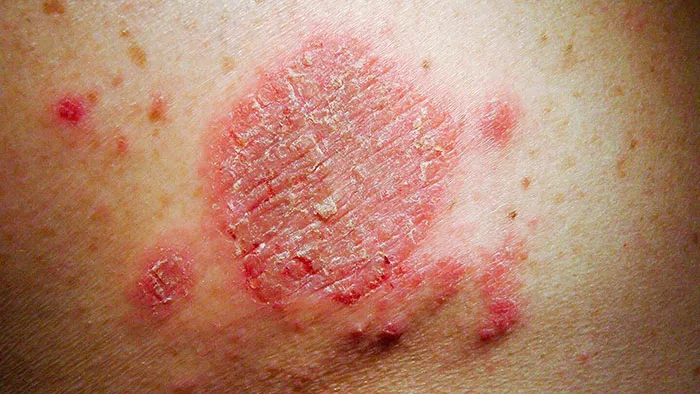Vitamin B3, also known as Niacin, is essential for maintaining the digestive function, skin health, and mental well-being of the body. It also supports the work of several enzymes and is involved in converting carbohydrates into glucose, metabolizing fats and proteins, and aiding the proper function of the nervous system. Vitamin B3 helps regulate sex hormones and manage stress, and also improves circulation and cholesterol levels.
Vitamin B3 deficiency occurs when the body cannot obtain or absorb enough of this vitamin.
Loss of appetite is one of the earliest signs of Vitamin B3 deficiency, which can range from mild to severe. The most common symptoms associated with this deficiency are related to the skin, digestive system, and nervous system.

Severe or prolonged Vitamin B3 deficiency leads to a disease called Pellagra, which causes dermatitis (redness, swelling, and skin irritation), vomiting, diarrhea, headache, fatigue, and memory loss. If left untreated, Pellagra can be fatal.
Diagnosis of Vitamin B3 deficiency is based on symptoms and a blood test that measures Vitamin B3 levels.
Consuming foods rich in Vitamin B3, such as milk, eggs, fish, chicken, dates, avocados, tomatoes, carrots, leafy greens, whole grain products, and nuts, can help overcome this deficiency.
What is the recommended daily intake of Vitamin B3?
Vitamin B3 is a crucial nutrient for maintaining good health. A deficiency in Vitamin B3 can lead to several serious health problems. It is important to consume an adequate amount of Vitamin B3 daily. However, the required amount may vary based on individual factors such as age, gender, and health status.
What are the symptoms of Vitamin B3 deficiency?
Vitamin B3 deficiency, also known as pellagra, can lead to a range of symptoms, including:
Skin Symptoms:
- Redness, burning, and swelling of the skin
- Hypersensitivity of the skin
- Canker sores
- Skin rashes
- Acne
Neurological Symptoms:
- Irritability
- Insomnia
- Headache
- Tremors
- Anxiety
- Depression
- Memory loss
- Psychosis
Digestive System Symptoms:
- Loss of appetite
- Indigestion
- Diarrhea
- Difficulty digesting fat
- Nausea and vomiting
Mouth, Eye, Nose, and Ear Symptoms:
- Redness and pain in the tongue
- Swelling of the mouth and intestines
- Loss of taste
- Painful gums
- Bad breath
- Heightened sense of smell
- Loss of vision
- Hypersensitivity to light
Other symptoms:
- Weakness
- Fatigue
If you experience any of these symptoms, it is important to see a doctor as soon as possible, especially if you have skin rashes and neurological symptoms.
What causes Vitamin B3 deficiency?
Vitamin B3 deficiency can occur for two reasons:
- Insufficient Vitamin B3 in the diet.
- Adequate Vitamin B3 intake but improper metabolism due to factors such as:
- Liver cirrhosis
- Excessive alcohol consumption
- Malabsorption of nutrients in the digestive tract
- Gastrointestinal diseases (e.g. ulcerative colitis)
- Chronic diarrhea
- Anorexia
- Carcinoid tumor
- HIV/AIDS
Additionally, excessive consumption of soybeans, seafood, and beans can also lead to pellagra.
Risk Factors for Vitamin B3 Deficiency
The following groups have been observed to be at risk for vitamin B3 deficiency:
- People who consume a diet primarily made of corn.
- Individuals with eating disorders, such as anorexia.
- Those who follow unproven diets for weight loss.
- Alcoholics, who are often deficient in other vitamins as well.
- Pregnant women.
- Breastfeeding women.
Patients with certain medical conditions are also more prone to vitamin B3 deficiency:
- Patients undergoing ionized therapy for the treatment of tuberculosis.
- Individuals with hypothyroidism.
- Patients with diabetes mellitus.
- Individuals with Hartnup’s disease, a genetic malabsorption condition that specifically causes vitamin B3 deficiency.
What is the best source of vitamin B3?
To avoid vitamin B3 deficiency, it is recommended to consume foods that are rich in this nutrient, such as meat, chicken, fish, peanuts, milk, and fortified cereals.
Foods high in Vitamin B3 include:
- Non-vegetarian options: chicken, eggs, animal liver.
- Nuts and seeds: groundnuts, oats, fenugreek seeds, sunflower seeds, pumpkin seeds.
- Vegetables and fruits: green peas, avocado, spinach, broccoli, mushrooms, and orange juice.
It is also important to drink enough water to avoid vitamin B3 deficiency.
How is Vitamin B3 deficiency diagnosed?
Vitamin B3 deficiency can be difficult to diagnose, as the symptoms may be vague or similar to those of other nutrient deficiencies. A doctor may take detailed information about the patient’s medical history and lifestyle to make an accurate diagnosis.
The deficiency can be confirmed through blood and urine tests, which measure the amount of vitamin B3 in the blood and urine.
In some cases, individuals may have vitamin B3 deficiency as well as other vitamin deficiencies, which can be caused by poor diet or difficulty absorbing vitamins. Additional tests, such as serum tryptophan, skin biopsy, complete blood count, serum albumin, serum protein, liver function test, and photosensitivity testing, may be necessary to check for these deficiencies.
How do you fix B3 deficiency?
If you suspect that you are deficient in Vitamin B3 but are not showing symptoms, you can include more Vitamin B3-rich foods in your diet.
Vitamin B3 supplements are recommended for some patients, such as those with malabsorption problems or diseases like Crohn’s disease or those who suffer from alcohol addiction for a long time or take drugs like isoniazid. Vitamin B2 supplements are given in combination with vitamin B3 to treat patients who have digestive, skin, and neurological symptoms and those with mild to moderate vitamin B3 deficiency.
Mild vitamin B3 deficiency is associated with dietary habits such as not regularly consuming foods rich in vitamin B3, B2, and B6.
With early diagnosis and treatment, the patient recovers quickly. The lesions formed on the skin begin to heal within 24 to 48 hours after the start of treatment.
What diseases can be caused by Vitamin B3 deficiency?
Nowadays, Vitamin B3 deficiency is an uncommon condition.
Vitamin B3 deficiency is often accompanied by other problems, and Vitamin B3 therapy and its supplements can help improve many of these problems effectively. These include:
Acne – Vitamin B3, especially in the form of ointment, has been scientifically proven to be very effective in reducing acne. Vitamin B3 helps in better absorption of fats in the body, reducing the chances of oil build-up in skin pores, which can form acne.
Depression – Deficiency in Vitamin B3 has often been linked to depression and other mental conditions.
Schizophrenia – This is a type of mental illness. Several studies have found that Vitamin B3 is very effective in treating schizophrenia and reducing the condition of hallucinations caused by it.
Multiple Sclerosis – Niacin helps in proper functioning of nerves and the brain. Vitamin B3 provides protection against multiple sclerosis and further brain damage and its complications. (Multiple sclerosis is a disease in which nerves start getting damaged.)

